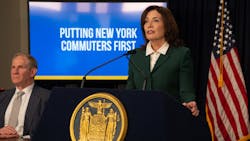UPDATED: Congestion pricing to be implemented in New York City starting January 2025
Updated on Nov. 19, 2024
On Nov. 18, the Metropolitan Transportation Authority (MTA) Board approved a plan to phase in new tolls as a part of congestion pricing during the next six years. With the new feature, all initial toll rates will be 60 percent of the initially approved rates in 2025, 2026, and 2027. Automobiles will be charged $9 during peak periods and $2.25 overnight. All other toll rates, including those for trucks, buses and motorcycles, as well as all crossing credits, will be 60 percent of the initially approved rates. From 2028 to 2030, the rates will stand at 80 percent of the initially approved rates – $12 for automobiles during peak times and $3 overnight. The full undiscounted rates will begin in 2031.
“Transit has to be preserved, expanded and improved or New York won't be New York,” said MTA Chair and CEO Janno Lieber. “New York couldn’t exist without transit and I’m proud that with Gov. [Kathy] Hochul’s leadership, we’re able to make more of those investments so thank you to the governor for getting us back on track and to the MTA Board, who along with the advocates and millions of everyday New Yorkers have never wavered, have never stopped fighting for better transit, a better city and a better metropolitan area.”
“This is a historic day on the path to rebuilding and improving our transit system,” said MTA Construction and Development President Jamie Torres-Springer. "Thanks to the governor’s leadership and today’s board action, we will immediately reactivate major contracts for critical projects, including work for the Second Avenue Subway Phase 2, accessibility projects and state of good repair work and we will continue to deliver these projects better, faster and cheaper.”
________________________________________
Original story:
Central Business District (CBD) Tolling, the country’s first congestion pricing program, will be implemented in New York City (NYC) after all, as New York Gov. Kathy Hochul revealed plans on Nov. 14 to begin congestion pricing by early January 2025.
Congestion pricing was supposed to launch in NYC on June 30. In early June, during a pre-recorded announcement, Gov. Hochul directed the Metropolitan Transportation Authority (MTA) to “indefinitely delay” the start of congestion pricing because the program “risked too many unintended consequences for New Yorkers at this time.” Six days after the program was paused, the MTA Board revealed it would not salvage the plan due to the state of New York’s pull of support.
Gov. Hochul’s plan to implement congestion pricing features a 40 percent reduction in all tolls for vehicles entering the city’s CBD, saving commuters up to $1,500 per year. The plan also includes new tools to reduce congestion and air pollution in communities citywide to ensure the plan achieves the goals of congestion pricing, including $15 billion in mass transit funding to support the MTA’s current capital program. The governor has also committed to funding the proposed 2025-2029 MTA Capital Plan that was approved by the MTA Board in September. The 2025-2029 MTA Capital Plan is the largest capital plan for transit in New York State history.
“As I said from the start, a $15 toll was just too high in this economic climate. That’s why our plan cuts the daytime toll to $9 for cars,” said Gov. Hochul said. “By getting congestion pricing underway and fully supporting the MTA capital plan, we’ll unclog our streets, reduce pollution and deliver better public transit for millions of New Yorkers.”
“New Yorkers deserve cleaner air, safer streets and ambulances that can get to them without gridlock and the governor is stepping up for them and for riders who need trains and buses to get them where they have to go — just like she did with the budget in 2023. Now you’re seeing it again, a huge milestone for 6.5 million commuters. We want to bring more frequent and reliable service — to all our customers — just like we have on the 7 and L lines where upgrades are already complete,” said MTA Chair and CEO Janno Lieber.
The adjusted phase in feature of the governor’s congestion pricing plan will be taken up by the MTA Board at its next meeting on Nov. 18. Under this plan, congestion pricing will be ready for implementation at midnight on Jan. 5, 2025.
“This first-in-the-nation program being launched by Gov. Hochul will help us achieve our goal of a less congested city of New York, with cleaner air and safer streets. It will also provide the critically important resources needed to create a more efficient and accessible public transportation system that will ease commutes and improve the quality of transportation for everyone in the metropolitan region,” said New York State Department of Transportation Commissioner Marie Therese Dominguez.
Congestion pricing plan
Toll structure and delivering $15 billion over Time for current MTA Capital Program
Under the updated congestion pricing plan, the toll structure for entering NYC’s CBD represents a 40 percent reduction in all tolls. The toll structure would initially be as follows:
- Daytime E-ZPass tolls
- Passenger vehicles (once per day): $9
- Motorcycles (once per day): $4.50
- Small trucks and non-commuter buses: $14.40
- Large trucks and sightseeing buses: $21.60
- Tunnel crossing credits reduced by 40 percent of original plan
- Nighttime discounts of 75 percent of daytime tolls
- Per-ride fees for all trips to, from or within the CBD
- Taxis and black cars: $0.75
- App-based for-hire vehicles: $1.50
For commuters who drive into the CBD five days per week, the 40 percent reduction in the toll will save them approximately $1,500 per year.
Additionally, some eligible drivers will receive additional discounts, credits and exemptions, such as a low-income volume discount or a qualified disability exemption.
While the toll structure under this plan is lower than the tolls initially proposed, it will still enable the MTA to leverage $15 billion in bonds for the MTA’s current capital program over time – the same goal for the congestion pricing program. The $15 billion in bonds includes supporting current capital program initiatives including:
- Second Ave Subway Phase 2 extension to East Harlem
- Modern signal systems on segments of the A/C and B/D/F/M lines for more than 1.5 million daily riders
- Accessibility improvements at more than 20 stations
- Hundreds of new electric buses
Additionally, the administration expects to achieve congestion reduction and air quality benefits set forth in the environmental review for the congestion pricing program, including a five percent reduction in vehicle miles traveled and a 10 percent reduction in the number of vehicles entering Manhattan’s CBD.
Pursuant to Gov. Hochul’s plan, MTA will not raise the initial tolls beyond the following percentages of the approved structure:
- 60 percent (a $9 daytime automobile E-ZPass toll) from 2025 through 2027
- 80 percent (a $12 daytime automobile E-ZPass toll) from 2028 through 2030
The phase-in feature over time aims to help drivers adapt more easily to the program and give the MTA and other stakeholders the ability to monitor data regarding implementation and effects.
Improving air quality in environmental justice communities
Gov. Hochul’s congestion pricing plan commits to funding the low-income discount and every place-based and regional mitigation as already committed to, including:
- $15 million to replace diesel-powered transport refrigeration units at Hunts Point Produce Market in the Bronx.
- $20 million to establish an asthma center and case management program in the Bronx.
- $20 million to implement electric truck charging infrastructure.
- $10 million to install air filtration units in schools near highways.
- $10 million to install roadside vegetation.
- $25 million to renovate parks and greenspace.
- $20 million to expand the NYC Clean Trucks Program.
- $5 million to expand the NYC Department of Transportation Off-Hours Delivery Program.
- A 75 percent discounted overnight toll to reduce diversions and encourage off-hours truck deliveries.
- A 50 percent discount on the daytime E-ZPass toll rate after the first 10 trips in each calendar month for low-income drivers.
New proposals to further reduce traffic and pollution
The governor is also proposing a package of new measures that will help reduce traffic and air pollution throughout NYC and beyond. The proposals will be included in her executive budget proposal in January and will include:
- Expansion of the successful joint MTA-NYC Automated Camera Enforcement program to permit enforcement of “blocking the box” violations at NYC street intersections, helping avoid gridlock and keep traffic moving smoothly.
- Expanded statutory authorization for the use of weigh-in-motion technology to help keep overweight vehicles off streets and improve traffic flow.
- Raising the threshold value for authorized removal of abandoned derelict vehicles and permitting the city to impose a surcharge for street permits on construction projects that block traffic lanes, promoting efficient use of curb space.
Expanding bus service across NYC
The governor is proposing the MTA increase frequency, make run time adjustments and deliver other enhancements on at least 23 bus routes citywide – including at least 15 local routes and eight express routes. Six of those express routes have been previously announced: BM2, BM5, SIM1C, SIM4C, SIM23 and SIM24. The other selected routes will be determined by the MTA based on ridership, crowding, equity priority areas and the presence of bus priority lanes.
Congestion pricing timeline
- August 2022: Environmental Assessment for congestion pricing program released.
- March 2023: Four members of the U.S. House of Representatives form caucus to push back against the program.
- May 2023: Federal Highway Administration (FHWA) approves release of the Final Environmental Assessment for the program.
- June 2023: FHWA issues a Finding of No Significant Impact (FONSI) for the project.
- December 2023: Traffic Mobility Review Board recommends tolling structure for the project.
- February 2024: MTA projects put on hold due to lawsuits against congestion pricing
- March 2024: MTA Board approves congestion pricing toll rates
- April 2024: MTA announces congestion pricing set to begin June 30
- June 2024: Congestion pricing paused by New York Gov. Hochul
- June 2024: MTA Board won’t salvage congestion pricing plan
- November 2024: New York Gov. Hochul reveals plans to launch congestion pricing in early January 2025
About the Author
Brandon Lewis
Associate Editor
Brandon Lewis is a recent graduate of Kent State University with a bachelor’s degree in journalism. Lewis is a former freelance editorial assistant at Vehicle Service Pros in Endeavor Business Media’s Vehicle Repair Group. Lewis brings his knowledge of web managing, copyediting and SEO practices to Mass Transit magazine as an associate editor. He is also a co-host of the Infrastructure Technology Podcast.

